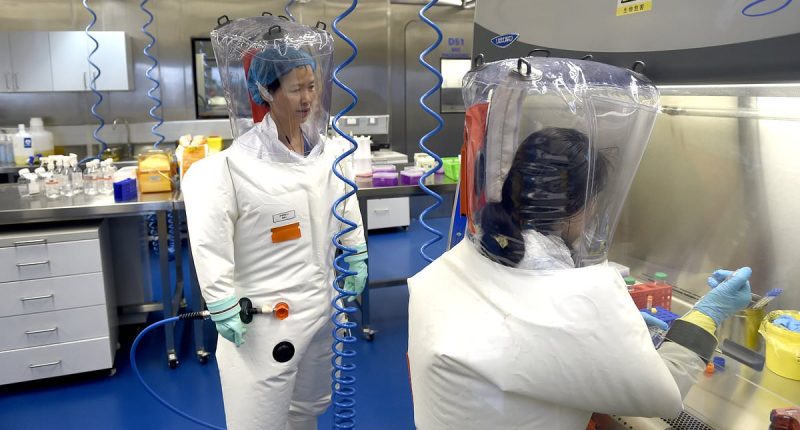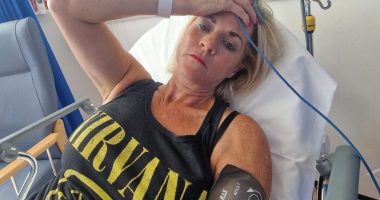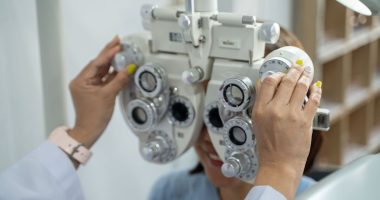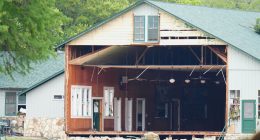Share this @internewscast.com
A group of experts investigating Covid origins on behalf of the World Health Organization revealed they still aren’t sure how the pandemic began.
At a press briefing Friday, chair of the group Marietjie Venter said most data supports the idea that Covid jumped to humans from animals.
It’s the same conclusion the WHO drew in 2021, when scientists said the virus likely spread from bats to human through another ‘intermediary animal.’
Venter said that after three years of investigating, the group was unable to get necessary data to determine if Covid was the result of a lab leak, despite hundreds of requests for genetic sequences and biosecurity information to the Chinese government.
She said: ‘Therefore, this hypothesis could not be investigated or excluded. It was deemed to be very speculative, based on political opinions and not backed up by science.’
The scientist added there was no evidence to prove that Covid had been manipulated in a lab, nor was there any indication that the virus had been spreading before December 2019 anywhere outside of China.
Venter claims the 27-member group did not reach a firm consensus on Covid’s origins, as one member resigned earlier this week and three others asked for their names to be removed from the report.
She said: ‘Until more scientific data becomes available, the origins of how SARS-CoV-2 entered human populations will remain inconclusive.’

Experts looking into Covid origins for the World Health Organization said there is not enough evidence to support the theory that the virus came from a Wuhan lab

Chinese researcher Shi Zhengli, known as ‘bat woman’ for her work on coronaviruses in bats, is pictured in her lab at the Wuhan Institute of Virology in 2019
The report comes after US authorities said earlier this month they had ‘seized’ Dr Anthony Fauci’s old phone in search of answers about Covid’s origin.
FBI boss Kash Patel told Joe Rogan: ‘We found it [the devices], and at least we can tell the American people we’ve been looking because it is of public importance to figure out, did that guy lie?
‘Did he intentionally mislead the world and cause countless deaths?’
The FBI and CIA have both asserted they think Covid most likely originated from the Wuhan Institute of Virology in Wuhan, China, which was conducting risky experiments on coronaviruses in the years leading up to the pandemic.
Some of those experiments were funded by US taxpayer money through grants awarded by Dr Fauci’s old department, the National Institute of Allergy and Infectious Diseases (NIAID).
WHO Director-General Tedros Adhanom Ghebreyesus said it was a ‘moral imperative’ to determine how Covid began, noting that the virus killed at least 20 million people worldwide, wiped at least $10trillion from the global economy and upended the lives of billions.
Last year, the AP found that the Chinese government froze meaningful domestic and international efforts to trace the virus’ origins in the first weeks of the outbreak in 2020 and that WHO itself may have missed early opportunities to investigate how Covid began.
President Donald Trump has long blamed the emergence of the coronavirus on a laboratory accident in China, while a US intelligence analysis found there was insufficient evidence to prove the theory.
Chinese officials have repeatedly dismissed the idea that the pandemic could have started in a lab, saying that the search for its origins should be conducted in other countries.
Last September, researchers zeroed in on a short list of animals they think might have spread COVID-19 to humans, including racoon dogs, civet cats and bamboo rats.
The German Federal Intelligence Service (BND) carried out a secret investigation into the origins of Covid nicknamed Project Saaremaa during the pandemic, sharing the findings with the US in December 2024.
Investigators found unpublished dissertations from 2019 and 2020 that allegedly discussed the effects of coronaviruses on the human body.

Fauci, pictured here making a phone call during a Senate hearing in 2022, has denied all allegations of covering up potential lab leak theories
Additionally, uncovered materials revealed Chinese scientists had ‘an unusually large amount of knowledge about the supposedly novel virus available at an unusually early stage.’
Based on the materials BND agents found and analyzed, they used a ‘Probability Index’ to measure the reliability of information, which determined the lab-leak theory was ‘probable’ with an ’80 to 95 percent’ certainty.
Robert Redfield, former CDC director when the pandemic erupted, also accused American and British health agencies of shutting down concerns over potential lab leaks.
He previously told DailyMail.com he is ‘100 percent’ convinced Covid was the result of scientists becoming infected while carrying out high-risk experiments to boost the infectivity of bat viruses amid low biosecurity in Wuhan labs.














